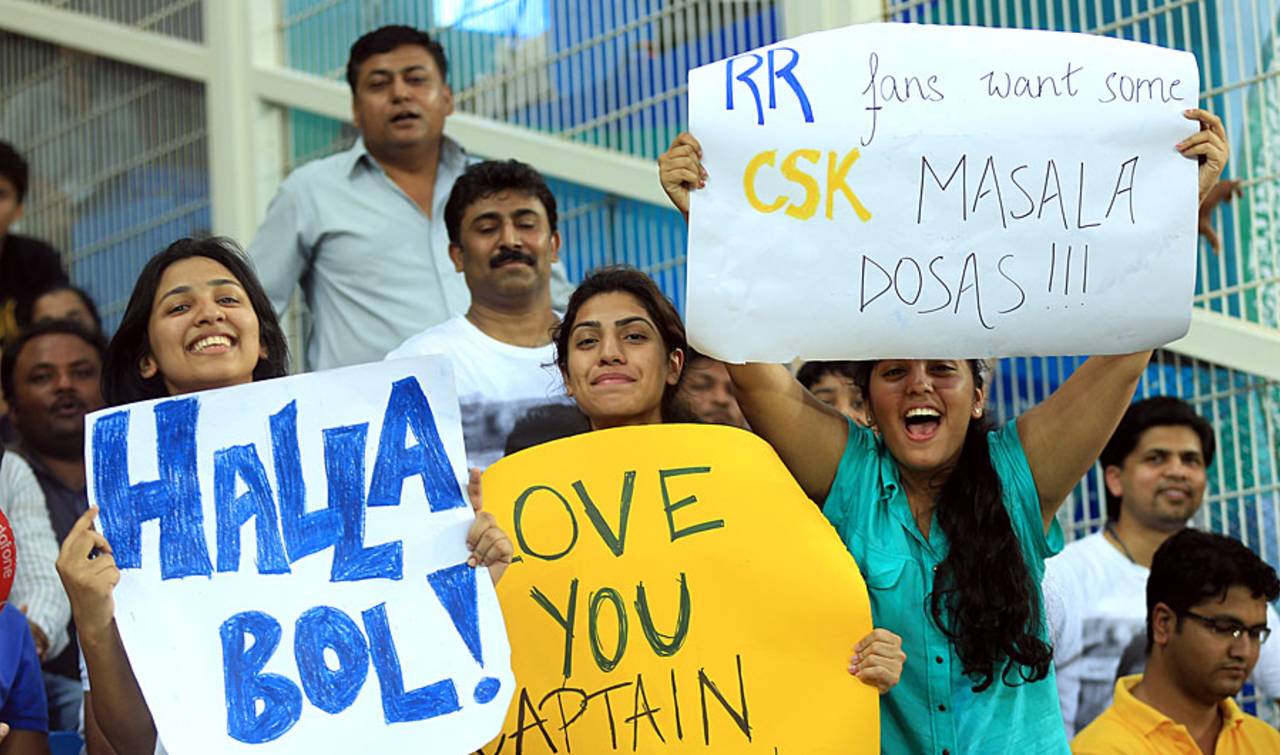A short history of the IPL business
A new book chronicles the league's off-field progress over its nine seasons and offers a strong argument for why India needs laws to deal with sporting fraud
Suhrith Parthasarathy
16-Jul-2016

The IPL: boon to Indian sport or embodiment of dubious values? • BCCI
"I am extremely proud that whatever we have seen over the last 44 days is a product of India," said the president of the BCCI, Sharad Pawar, after the final of the IPL's inaugural edition in 2008. At that point it was perhaps not immediately evident that the league's bedrock wasn't strong enough for it to continue to instil in its organisers a sense of pride. Indeed, over the course of eight further seasons, the IPL's regression - via controversies both on and off the field, and deeply entrenched conflicts of interest - has been so complete that in spite of maintaining a sense of legitimacy amongst its participants, it has increasingly, for at least some of the public, become synonymous with all that is wrong with modern-day cricket.
Amid the hullabaloo, though, it has been undeniable that the IPL has had a deep impact on cricket as a sport and as a business. And it's the latter aspect that Not Out!, the Delhi-based sports lawyer Desh Gaurav Sekhri's book, seeks to concentrate on.
Thus far, in spite of the fact that in just nine seasons the IPL has transformed the way we view cricket, we haven't had a detailed account, of any reasonable length, chronicling its story. In Not Out!, Sekhri seeks to do precisely this, or, as he describes it, to tell us the "incredible story of the Indian Premier League".
As a contemporary history of the IPL's nine seasons, the book serves as a fine resource. It captures neatly the underlying facts, from the sources of revenue that allowed the IPL to be established, to the various controversies that have plagued it, including lesser known issues, such as one to do with the payment of facilitation fees for broadcast rights, which ultimately required the Supreme Court's intervention.
However, in spite of chronicling the IPL's history in fairly lucid detail, Sekhri fails to question the ethos that pervades the tournament. The book rather takes the commercialisation of the sport for granted. It even begins with a curious assertion that "put simply, the IPL is an entity that is fashionable to dislike, but at the same time, is a regrettable necessity for Indian society". Over the course of the book, though, we find no evidence to back up this claim: that the IPL "is too popular to just be a fad, and has too many legitimate corporates investing in it to simply be labelled a racket" doesn't quite do enough to explain to us why the league does us a service.

Penguin/Viking
To Sekhri's credit, though, in a well-tuned chapter he shows us how the IPL differs from other professional sports leagues, and also offers reasonable suggestions on how it may benefit from adopting some of their best practices. The book also contains a significant chapter in which he lays out the several issues of conflict of interest that the IPL has been repeatedly bogged down by. And he presents to us clearly the recommendations of the Supreme Court-appointed Justice Lodha committee, which, he says, if implemented, could "have long lasting repercussions for the IPL as we know it".
Sekhri's suggestion for how the BCCI could circumvent court-mandated regulation, however, is curious. He endorses greater privatisation through a model in which the IPL's commercial rights could be assigned to a separate private entity under the larger control of the BCCI.
Sekhri is at his best when he describes measures and laws that could beef up integrity in sport. One such example that he provides is the draft "Prevention of Sporting Fraud" bill that was introduced in 2013. "Despite sport in India being a state subject, for something as far-reaching and potentially harmful to sport in the country, central legislation in the national interest will be the inarguable solution," he writes. As he rightly points out, the existing criminal-justice mechanisms are either too onerous (such as the Maharashtra Control of Organised Crime Act, which was invoked against cricketers charged with spot-fixing in the IPL) or plainly obsolete (the Public Gambling Act) to be of any use. A designated sports fraud law, Sekhri writes, could, on the other hand, restore an element of credibility to cricket in that it would contain a framework of rules that are sui generis to sport.
For those undoubting of the IPL's contribution to sport, as to those more sceptical of its inherent values, Sekhri's book offers a useful reminder of the facts that underscore the various arguments.
Not Out! The Incredible Story of the Indian Premier League
By Desh Gaurav Sekhri
Viking
256 pages, Rs 330
By Desh Gaurav Sekhri
Viking
256 pages, Rs 330